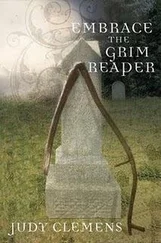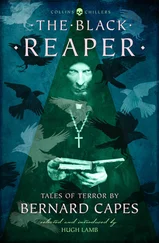Bernard Knight - The Grim Reaper
Здесь есть возможность читать онлайн «Bernard Knight - The Grim Reaper» весь текст электронной книги совершенно бесплатно (целиком полную версию без сокращений). В некоторых случаях можно слушать аудио, скачать через торрент в формате fb2 и присутствует краткое содержание. Год выпуска: 2002, ISBN: 2002, Издательство: Simon and Schuster, Жанр: Исторический детектив, на английском языке. Описание произведения, (предисловие) а так же отзывы посетителей доступны на портале библиотеки ЛибКат.
- Название:The Grim Reaper
- Автор:
- Издательство:Simon and Schuster
- Жанр:
- Год:2002
- ISBN:9780671029678
- Рейтинг книги:5 / 5. Голосов: 1
-
Избранное:Добавить в избранное
- Отзывы:
-
Ваша оценка:
- 100
- 1
- 2
- 3
- 4
- 5
The Grim Reaper: краткое содержание, описание и аннотация
Предлагаем к чтению аннотацию, описание, краткое содержание или предисловие (зависит от того, что написал сам автор книги «The Grim Reaper»). Если вы не нашли необходимую информацию о книге — напишите в комментариях, мы постараемся отыскать её.
The Grim Reaper — читать онлайн бесплатно полную книгу (весь текст) целиком
Ниже представлен текст книги, разбитый по страницам. Система сохранения места последней прочитанной страницы, позволяет с удобством читать онлайн бесплатно книгу «The Grim Reaper», без необходимости каждый раз заново искать на чём Вы остановились. Поставьте закладку, и сможете в любой момент перейти на страницу, на которой закончили чтение.
Интервал:
Закладка:
There was a pregnant silence.
‘Murdered whores, mutilation and fires seem to recur often in this sad story,’ said the Bishop. ‘Have you anything to say on the matter, Adam of Dol?’
The priest’s pugnacious face jerked up defiantly. ‘Sin is sin, whether it be in Exeter, Salisbury or Devizes! It needs to be rooted out wherever it occurs.’
‘Which offers you your perverted pleasures at the same time, no doubt,’ said Henry Marshal dryly. ‘If that is the last of your sad catalogue, Archdeacon, then I have something to add, which I learnt only today.’
The company turned expectantly to their superior.
‘Since it became public knowledge that this deranged fellow had been apprehended, his own confessor came to me in great concern. Father William Angot, of the church of Holy Trinity, has been on a pilgrimage to Canterbury and only returned yesterday, so he knew nothing of the spate of killings during these past few weeks. Mindful of the sanctity of confession, he has been disconsolate about what to do but came to me for guidance. Though we accept that confessions are never disclosed, even to fellow priests, in the circumstances I gave a dispensation to Father William to divulge what he felt was relevant to this vile situation.’
‘You had no such right!’ howled Adam, his eyes bulging in a face almost puce with rage.
Ignoring his outburst, Henry Marshal continued in cold, even tones: ‘Though this evil man had not deigned to make confession for almost half a year, according to William Angot, in the past he has admitted to such strange behaviour and actions that his confessor urged him repeatedly both to desist and to seek counselling from higher authorities. He had suggested pilgrimages to Canterbury and even to Rome, but Adam rejected these notions with scorn.’
All eyes and ears were now on the Bishop, waiting to hear what came next,
‘From such confessions over several years, William gathered that the roots of this man’s madness are rooted in his childhood. His father treated him with contempt and his mother and a sister were confined by force in a nunnery, due to distressing afflictions of the mind. In his rejection, he began to torture small animals and developed a passion for fire, causing a number of conflagrations on their estate in Totnes. Eventually, his father disposed of him to the cathedral school in Wells, mainly, it seems, as a means of getting rid of a troublesome embarrassment.’
Adam began again to shout denials and curses and tried to move towards the dais on which his accusers sat, but the proctors and their henchmen restrained his struggles.
‘His so-called confessions became progressively more like the abuse and cant we are hearing from him today — which is another reason why I have sanctioned the limited revelation of his dealings with Father William. He admitted his fornication with harlots, thankfully well away from Exeter, and he gave broad hints about the revival of his fascination with fire and torture, which seem to have been manifest in a perverse degree in his preaching and those abominable paintings that desecrate the walls of St Mary the Less. I have been myself to see them today and have given orders that they be whitewashed over without delay.’
This provoked another howl of protest from Adam, who viewed the obliteration of his artwork as an even greater tragedy than his own arrest, but the Bishop was unmoved as he brought the interview dispassionately to an end.
‘Adam of Dol, it is the Consistory Court that will finally judge you, though I will appoint its chancellor and its members. At this stage, all I will do is to wonder whether you are totally deranged or totally evil. Whichever it is, there is no doubt that the Satan you claim to fight, has invaded your mind. Indeed, he seems to have been residing there since your childhood and it is a great pity that those who had the care and teaching of you in the early days of your church career did not cut out this perversity, root and branch.’ With the words, ‘Take this creature out of my sight’, he rose and, to the bows of his colleagues, turned to leave through the door behind his chair.
‘And that’s that, until the Consistory Court is convened next week,’ concluded John of Alençon later, over a flask of wine with his friend the coroner.
‘One thing puzzles me,’ replied de Wolfe. ‘His relationship with Ralph.’
De Wolfe told the whole story to Gwyn, Thomas and Nesta, when they were sitting at their table in the Bush on Saturday evening. The matter had been aired again that day in the Shire Hall, when John de Alençon, as Archdeacon of Exeter, had come to deliver his Bishop’s decision to the Justices.
‘Henry Marshal has done this to emphasise the Church’s independence of royal authority,’ commented the coroner sourly, ‘and I suspect he has used the opportunity to hint at his own partiality to Prince John by delivering a snub to King Richard in taking Adam out of the jurisdiction of his courts.’
‘I should have broken the bugger’s neck instead of his ribs when I pulled him off that ladder,’ grunted Gwyn. ‘It would have saved a lot of trouble.’
Nesta, resplendent in a new kirtle of fawn wool under her white linen apron, looked radiant and content, with her lover and friends around her. But she was rather hazy as to the outcome of this latest drama.
‘The Bishop refused to give this “Benefit of Clergy” to poor Thomas here,’ she said, ‘so why is this murderer so favoured? And what does it mean, anyway?’
‘Poor’ Thomas, as he seemed fated to be known from now on, provided her with an explanation himself, glad to be free of competition from the erudite Brother Rufus. ‘It’s existed for centuries in many countries, in one form or another — mainly to emphasise the Church’s superiority over kings and emperors, as the crowner said just now.’
‘It just seems a way of avoiding the harsh justice that the rest of us have to endure,’ objected Nesta.
Always a champion of his beloved Church, the clerk disagreed and explained further. ‘It doesn’t absolve priests from trial, but transfers their judgement to a different court. It had a great boost in England in old King Henry’s reign, when as part of his penance for having Thomas Becket killed’ — here he paused to make the Sign of the Cross — ‘he accepted the Church’s demand for recognition of Benefit of Clergy, which took them from the secular courts to the Bishop’s Consistory Court.’
‘So it’s entirely up to Henry Marshal what happens to this murdering bastard,’ grumbled Gwyn, wiping the ale from his moustache. ‘He can let him off if he wants to.’
‘It’s not that simple. The Consistory Court makes the final decision.’
‘Oh, come on! Who’s going to be brave enough to cross the Bishop, eh? He must already have some crafty scheme to deal with this madman.’
John was massaging Nesta’s thigh under the table, but he didn’t allow that pleasant pursuit to distract him from the conversation. ‘The Archdeacon told me that Henry Marshal is going to recommend that Adam be incarcerated in the Benedictine monastery of Mont St Michel in Normandy. It seems the Bishop is a friend of the Abbot there, and can ensure that the maniac works off his obsessions with hard labour for the rest of his life, carrying building stones up the mount for the new church on top. I think he’d probably prefer to be hanged.’
Thomas’s forgiving nature allowed him to feel a twinge of pity for Adam. He crossed himself again and said, ‘At least he’ll be near Dol, his birthplace, which is within sight of Mont St Michel.’
Nesta’s forehead wrinkled in thought. ‘I’ve heard somewhere that even men who are not really priests have been given this Benefit of Clergy. Can that be true?’
Читать дальшеИнтервал:
Закладка:
Похожие книги на «The Grim Reaper»
Представляем Вашему вниманию похожие книги на «The Grim Reaper» списком для выбора. Мы отобрали схожую по названию и смыслу литературу в надежде предоставить читателям больше вариантов отыскать новые, интересные, ещё непрочитанные произведения.
Обсуждение, отзывы о книге «The Grim Reaper» и просто собственные мнения читателей. Оставьте ваши комментарии, напишите, что Вы думаете о произведении, его смысле или главных героях. Укажите что конкретно понравилось, а что нет, и почему Вы так считаете.












